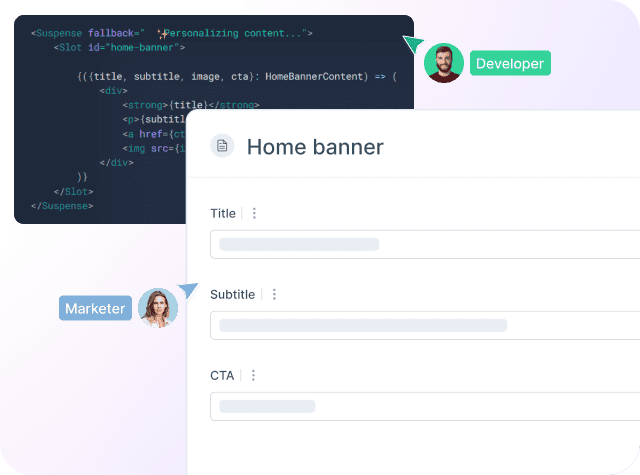If your company uses Next.js, your developers will love our latest news.
We just rolled out an SDK tailored to businesses like yours, and now is the best time to dive in: our onboarding experience is now smoother than ever.
Why devs will love it
Our new SDK provides a much more straightforward integration process. It's incredibly easy to install and requires minimal configuration, supporting both server-side and client-side rendering.
Features include automatic token authentication, global timeout settings, and more.
Both our support efficiency and ease of integration were already differentiators before this launch — and we've garnered positive feedback from our clients about that. Now, more than ever, integrating with high-level frameworks like Next.js aligns seamlessly with one of our core objectives: providing a great dev experience for personalization.
Make everyone happy with the tools the growth team loves: dynamic content, personalization, AB testing, and analytics.

What changes for those using our React plug?
If you are using our React integration, you can easily migrate to our Next.js plug by following our documentation.
However, switching to server-side rendering may require regenerating client IDs, as local storage (used by default in the Plug and React integrations) is not compatible with hybrid rendering.
That is why we've added a feature to make our plug for JavaScript a future-proof choice. It allows you to use first-party cookies with either React or Vanilla JavaScript — even if you don't use server-side rendering yet.
If you use Next.js and other stacks, it's essential that all applications share the same first-party cookies. This is the best way to maintain consistency in user identification across different environments.
That’s a wrap
Previously, integrating Croct with Next.js through the React plugin required significant custom code. To streamline this process, we've created an SDK that automates the entire integration and gets you up and running quickly.
By using Croct, developers no longer need to manage separate projects for testing marketing strategies, freeing them to focus on delivering impactful business features.
Check out the SDK repository or contact us if you have any questions about the new integration.
If you haven’t created your account yet, sign up and take the first step toward joining the next generation of advanced personalization.